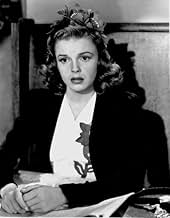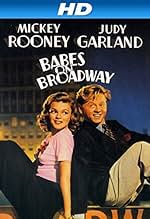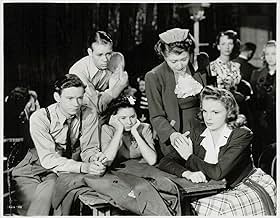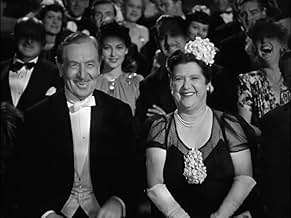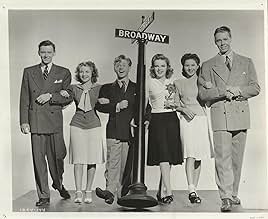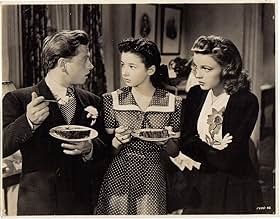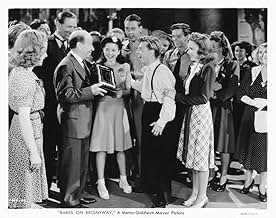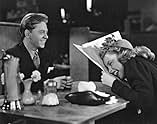Aggiungi una trama nella tua linguaPenny Morris and Tommy Williams are both starstruck young teens but nobody seems to give them any chance to perform. Instead, they decide to put up their own show to collect money for a summ... Leggi tuttoPenny Morris and Tommy Williams are both starstruck young teens but nobody seems to give them any chance to perform. Instead, they decide to put up their own show to collect money for a summer camp for the kids.Penny Morris and Tommy Williams are both starstruck young teens but nobody seems to give them any chance to perform. Instead, they decide to put up their own show to collect money for a summer camp for the kids.
- Regia
- Sceneggiatura
- Star
- Candidato a 1 Oscar
- 1 candidatura in totale
- Man
- (scene tagliate)
- Elinor Downing, War Refugee
- (non citato nei titoli originali)
- Butch
- (non citato nei titoli originali)
- Mrs. Crainen, the Matron
- (non citato nei titoli originali)
Recensioni in evidenza
This movie is a product of its times. But these times aren't much better. Which is worse, black face routines or movies with gratuitous sex and blatant violence, blood, and guts? Racism is a horrible thing but it goes on in movies even today (in films made by Caucasian and African-Americans). What makes the black face routine even worse is that it was totally unnecessary to the plot and they could have done something better.
Several talented young people, just starting out, try to make it big on Broadway. That's the story premise. The script presents a thin, superficial plot. Dialogue lacks significant subtext. But, of course, the plot's real purpose is to create continuity in a film meant to showcase the musical talents of its two big stars: Mickey Rooney and Judy Garland. They, along with a large cast, sing and dance in various musical productions, some good, some not so good.
Which leads to my main criticism of this film: the editing. With a thin plot and a runtime of two hours, large chunks could have been chopped out. I have no idea why they included a Beethoven piano performance by a child prodigy; it has no connection to anything. Similarly, the "Hoe Down" musical segment is arguably weak. And, though I commend the producers for acknowledging Great Britain's War efforts, devoted plot elements are thematically irrelevant and overly long.
On the other hand, the best sequence in the film is its grand musical finale, a tribute to the American South. This segment provides a nice contrast to New York's Broadway allure. Dialogue here refers to an "old-fashioned" minstrel show. Most of the songs are from decades earlier. Musical lyrics include the wording "And boy that Southern cooking is okay". Clearly, the intent is to salute the South. So putting performers in black face is entirely appropriate within the well-defined historical context.
Performances are fine. Judy Garland shines. Fay Bainter, ideally cast as a theatrical agent, also gives a good performance. At various points Ray McDonald excels as a tap dancer; he's almost in the same league as Fred Astaire. And impersonating "Brazil bombshell" Carmen Miranda, Mickey Rooney is funny in drag, wearing platform shoes, tawdry women's jewelry, and a flamboyant hat as he sings Miranda's signature song "Mamae Eu Quero". Throughout the film Rooney exudes confidence, energy, and a highly animated persona.
The film's sets and costumes, dialogue about tough times, as well as the selected music and the big accent on tap dancing, combine to give viewers a pretty good feel for American pop culture in the early 1940s. It's by no means a perfect film. But it's worth watching, mostly for nostalgia, as representative of an era that is gone forever.
What seems to get the most reaction here on IMDb is not surprisingly the minstrel number at the close of the show with all of the actors in blackface. Yes it's dated and offensive but some of the comments here are way over the top. One imbecilic individual even said Mickey Rooney shouldn't have been allowed to work again! Put the Kool-Aid down, kid.
Lo sapevi?
- QuizVincente Minnelli conceived and supervised the "Ghost Theater" sequence where Garland and Rooney imitate theatrical notables of the past.
- BlooperWhen Alexander Woollcott is introducing the story, at one point his bow tie disappears and his collar is open.
- Citazioni
Maxine, Little Girl at Audition: Please wait, don't send my brother to the chair, don't let him burn, please, please warden, please.
- Versioni alternativeSome older television prints of the film delete the minstrel show finale.
- ConnessioniEdited into Hollywood: The Dream Factory (1972)
- Colonne sonoreBabes on Broadway
(uncredited)
Music by Burton Lane
Lyrics by E.Y. Harburg
Played and sung by a chorus during the opening credits
Reprised as a production number with the principal cast near the end
Sung and danced to by Judy Garland and Mickey Rooney in blackface
Danced to by Ray McDonald in blackface
I più visti
- How long is Babes on Broadway?Powered by Alexa
Dettagli
Botteghino
- Budget
- 940.068 USD (previsto)
- Tempo di esecuzione
- 1h 58min(118 min)
- Colore
- Proporzioni
- 1.37 : 1


